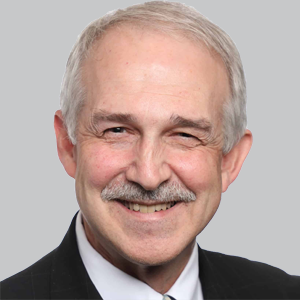Neurology Live
Vincent Martin, MD, president of the National Headache Foundation, discussed the MOTS trial, a non-inferiority study aimed at understanding treatment strategies with preventives for chronic migraine.

Vincent Martin, MD
The Medication Overuse Treatment Strategy (MOTS) trial was an open-label, pragmatic clinical trial that aimed to determine whether migraine preventive therapy without switching or limiting the frequency of the overused medication was inferior to migraine therapy preventive with switching from the overused medication to an alternative. A total of 720 patients with chronic migraine were randomized 1:1 to migraine preventive medication and either switched from the overused medication to an alternative used less than 2 days a week or continued on the overused medication with no maximum limit.
At the conclusion of the analysis, investigators found that migraine preventive medication without switching of the overused medication was not inferior to preventive medication with switching in terms of moderate to severe headache day frequency during weeks 9 to 12 (switching, 9.3 [SD, 7.2] vs no switching, 9.1 [SD, 6.8]; 95% CI, –1.0 to 1.3; P = 0.75). Additionally, effect on moderate to severe headache days was also similar between the 2 treatment strategies during the first 2 weeks (switching, 6.6 [SD, 3.7] days vs no switching, 6.4 [SD, 3.6]; 95% CI, –0.4 to 0.7; P = 0.57).
To learn more about the trial and understand the implications of the findings, NeurologyLive® sat down with study investigator Vincent Martin, MD. Martin, a professor of medicine and director of the UC Headache and Facial Pain Center, also serves as president of the National Headache Foundation. He discussed the reasons for the trial, the need to study medication overuse in this chronic migraine population, and whether the findings will change the way clinicians go about prescribing treatment regimens.
NeurologyLive®: Can you provide some background on the study and its design?
Vincent Martin, MD: The trial is called the Medication Overuse Treatment Strategy (MOTS) trial. Basically, it was a study where we looked at 2 different treatment strategies of patients that have medication overuse headaches. Those are people that usually have greater than 15 days with headache and have a variety of different levels of overuse of acute medications. Patients were randomized to one group where they were placed on a preventive medication and then they were withdrawn from their overuse medication vs the other group, where they were placed on a preventive medication with no withdrawal. They were able to take their medication freely. What we’re trying to figure out is, is it necessary to withdraw medications from people with medication overuse headaches when you started preventive? That was the overall objective. It was a non-inferiority trial, which meant our goal was to find out if 1 therapy was inferior to another.
Is medication overuse typical in patients with chronic migraine? How have we typically combated this overuse?
Medication overuse headaches are very common in a headache clinic. It probably accounts for about 50% or 60% of all patients. In neurology practice it’s probably not quite that high, but it’s probably high in people with chronic migraine. It usually involves about at least 30% or 40% of all patients in neurology practice with chronic migraine medication overuse. It’s extremely common. In the past, what we’ve done is said, well, let’s put them on a preventive and then we have to withdraw the medication. I can tell you that can be somewhat contentious because the patient thinks they’re taking the medication to treat their headaches and if they don’t take the medication their headaches are going to be out of control, get worse, or they’re going to be more disabled. To tell a patient, for example, that they have to withdraw their medication, which they see as their lifeline, is something that’s a bit problematic for people. It seems counterintuitive and so forth. This trial helps answer that question to some extent.
How might these results change or not change the way clinicians treat patients with chronic migraine?
It does change the approach. What we found was that neither therapy was inferior to the other. They had comparable results. This probably means that when you have someone with medication overuse headaches, the most important thing is to put them on an effective preventive medication. If that happens, you’re going to get improvements, regardless of whether you withdraw the medication. Now, there are several caveats to that. In the past, what has been found in studies is that patients who overuse Butalbital-containing medications, as well as narcotics, seem to have a higher risk of medication overuse headaches than people who overuse triptans like sumatriptan or zolmitriptan, or even acute medications like anti-inflammatories or Tylenol.
Our study did not have a huge percentage of people that took Butalbital-containing medications or narcotics, so this may not necessarily apply to that subgroup of patients. The other thing we found which was interesting was that there may be different subgroups of people that may respond somewhat differently. For example, patients that had anxiety did a little bit worse in the group where you have to withdraw the overuse medication and then start another medication but not overuse it. That may simply be because getting off a medication may be so anxiety-provoking to them. If they’re in a state of anxiety, it may make things worse. Then there was another group where the headaches were very frequent, like 25 days-plus, where those people did better with the preventive medication plus acute medication withdrawal. There could be some subgroups of patients that may be different than what the overall study results truly found.
The transcript was edited for clarity.
REFERENCE
Schwedt TJ, Hentz JG, Sahai-Srivastava S, et al. Patient-centered treatment of chronic migraine with medication overuse: a prospective, randomized, pragmatic clinical trial. Neurology. 2022;98(14). doi:10.1212/WNL.0000000000200117
Shared from Neurology Live

